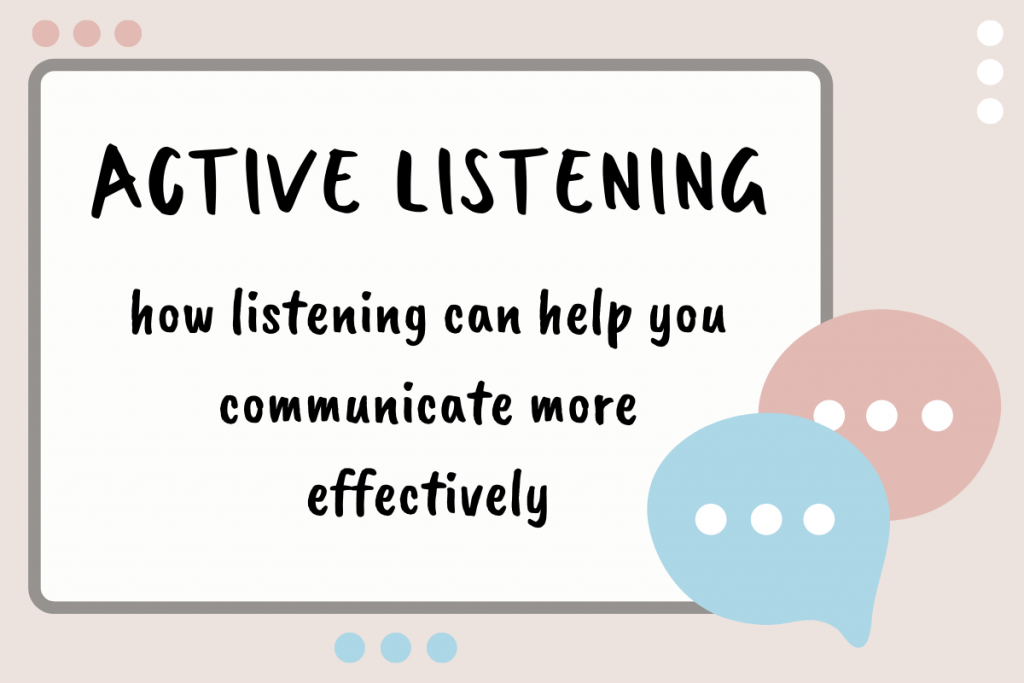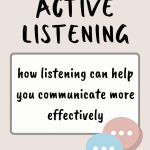Active Listening is a Forgotten Communication Skill
Listen Up: The Gift of Presence
“We have two ears and one mouth so that we could listen twice as much as we speak.”
Epictetus
Active listening is a vital communication skill that can deepen connection and understanding in all types of relationships. However when active listening is missing, it can have big consequences. Active listening is a technique of giving and showing your full attention through careful listening, observation of nonverbal cues, and feedback in the form of accurate paraphrasing and thoughtful response.
When we fail to give our full attention, we are not appreciating the gift of understanding the speaker is giving. When we forget the IMPORTANCE of listening, we are consciously or unconsciously saying we value our thoughts and opinions more than the person we are talking to.

What is the Value of Listening?
Being present has great value in relationships and is the most important gift you can give to someone you love! Listening is especially a vital skill if your partner’s love language is quality “time”- one that needs daily practice. (The Five Love Languages by Gary Chapman)
I have compiled a list of seven ways that listening can help you communicate more effectively and connect with your partner, children, friends, and coworkers.
1. RESPECT
Listening shows respect or regard for the other person. You are telling the other person that they are important to you by showing “unconditional positive regard”. Being kind and considerate is a way to show regard for another person. Doing this will also build rapport.
2. UNDERSTANDING
Active listening helps you to increase your knowledge and understanding of the person you are listening to. Great listeners are always striving to learn and grow in their knowledge of those with whom they are in relationship. Listening well and growing your knowledge and understanding of a person will lead to a much deeper connection over time.
3. TRUST
Listening builds trust. When people know they can speak freely to you without interruptions, unwelcome interjections, or judgment, they will be more likely to confide in you. This is especially true when meeting someone for the first time.
4. CONNECTION
You build connection and rapport when you listen. Active listening helps others feel comfortable sharing information with you. When you demonstrate your ability to sincerely listen to what others have to say, people will be more interested in sharing with you on a regular basis.
5. VALUED
Listening let’s the person know that they are valued. Active listening will help you to avoid missing important and crucial information. This is especially important in intimate relationships! Being able to remember and recall details communicates “what is important to you is important to me”. As the listener you can do this by paraphrasing the information and following up with thoughtful questions.
6. SUPPORT
Encourages and is supportive of the speaker. Listening actively says you are interested in them as a person. Listening is an active supportive behavior that encourages conversation and interaction.
7. SAFETY
Active listening creates an emotionally safe environment. Listening without judgement, interruption, or advice, creates an emotionally safe environment for a person to share deeper thoughts and feelings.
While listening skills are not particularly difficult, active listening is hard and takes practice and commitment. When you make a commitment to be an effective listener, your “relationship IQ” will grow with your relationships.
*This article is an excerpt from Dr. Gilbert’s next book called, “Five Essential Habits of Healthy Relationship”.

Dr. Don Gilbert, MS, PHD, LMHC, BCPC is the owner of New Life Counseling. He trained under Dr. Gary Rosberg, is John Maxwell Certified, is an ordained minister, a published author, and has over 20 years of face to face counseling experience. Dr. Gilbert is no longer taking new counseling clients, but he is available for trainings, coaching, and speaking. Please contact us for more information.

